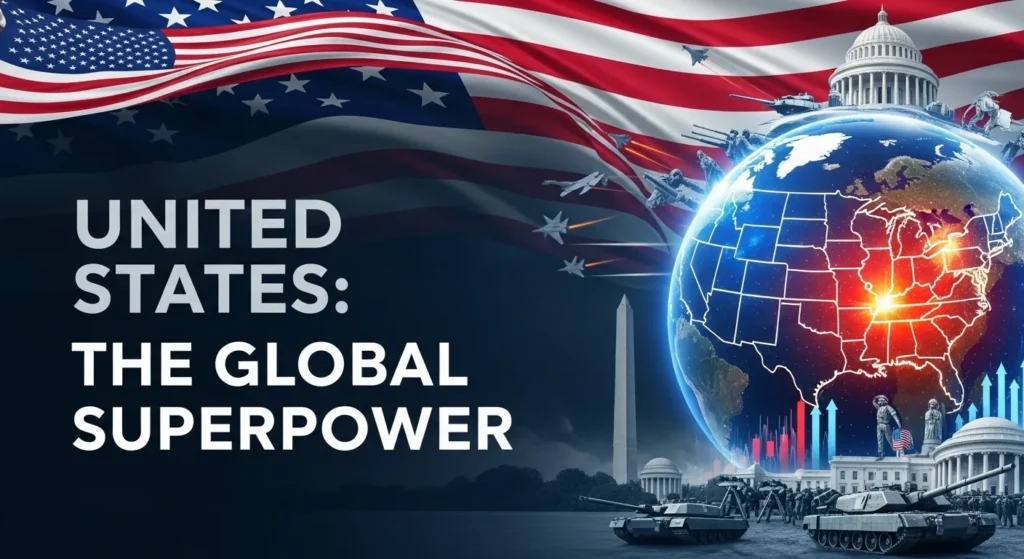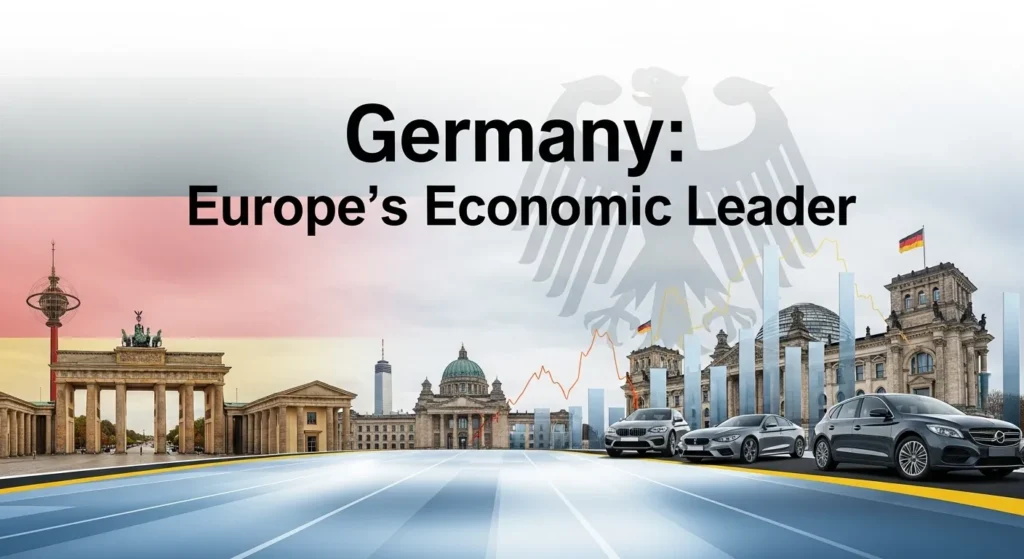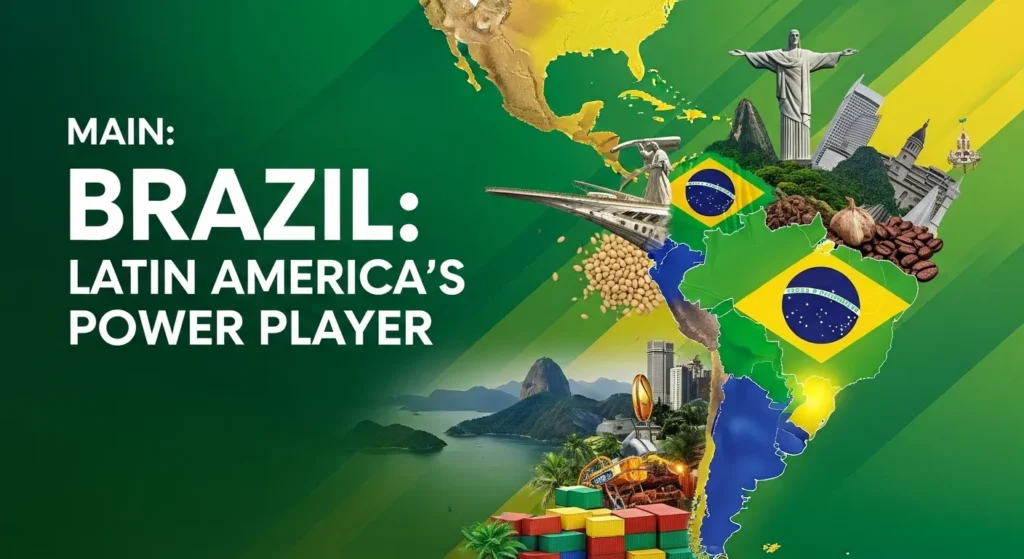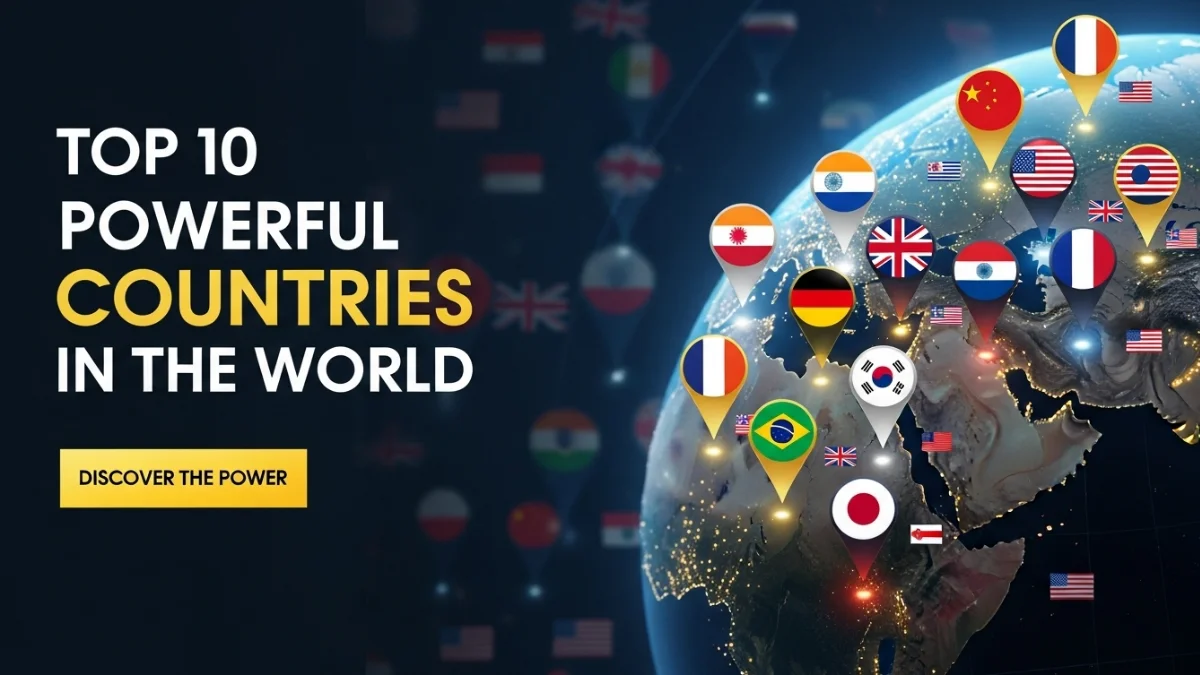The top 10 powerful countries in the world in 2025 include the United States, China, Russia, India, Germany the United Kingdom, France, Japan, South Korea and Brazil. These nations control the world through military strength, economic powe,r technological innovations and global power.
This article will explore the top 10 most powerful countries in the world in 2025. By examining their military capabilities, economic performance and geopolitical influence, we will provide a complete overview of why these nations stand at the top.
Follow us on our WhatsApp channel for more update:
Understanding Global Power:
When ranking the most powerful countries we consider multiple factors like military strength economic power, political influence technological advancements and global stability. The ranking of these nations is not static and can shift due to political changes, financial crises or emerging technologies. Let’s explore the countries that currently hold the most global power.
1. United States: The Global Superpower:

Military Might:
The United States remains the most powerful country in the world in 2025. The country boasts the largest military budget globally, equipped with state-of-the-art technologies, including advanced fighter jets, nuclear submarines and cutting edge cyber capabilities. The U.S. military position in numerous strategic regions reinforces its dominance.
Economic Influence:
The U.S. economy is the largest in the world driven by innovations in technology finance and everyday goods. It also remains the global leader in international trade and financial markets. The U.S. dollar is the world’s reserve currency further strengthening its economic position.
2. China: The Emerging Superpower:
Rapid Military Expansion:
China’s growing military strength is obvious. With one of the largest standing forces and ongoing advancements in air and naval capabilities China is positioning itself as a global military leader. Its defence budget continues to increase making it a powerful force.
Economic Growth:
As the world’s second-largest economy China has emerged as a manufacturing powerhouse and a global hub for technological innovation. China’s Belt and Road Initiative has expanded its economic influence in Asia, Africa and Europe.
3. Russia: A Major Military Power:
Military Strength:
Russia maintains one of the largest and most advanced militaries in the world with a particular focus on nuclear weapons. Its strong presence in Eastern Europe the Middle East and Central Asia showcases its military power.
Geopolitical Influence:
Russia’s strategic positioning and involvement in various international conflicts have enabled it to wield significant political influence. Its energy resources particularly natural gas play a major role in global geopolitics.
4. India: The Rising Giant:
Growing Military Power:
India is steadily increasing its military capabilities with modern weapons and expanding defence infrastructure. It has become a significant military player particularly in South Asia and the Indian Ocean region.
Economic and Technological Growth:
India is one of the fastest growing economies in the world driven by its IT sector and growing manufacturing industries. It is also making progress in space technology and green energy which adds to its global influence.
5. Germany: Europe’s Economic Leader:

Economic Powerhouse:
Germany’s economic might is supported by its leadership in manufacturing particularly in automobile engineering and industrial machinery. As the largest economy in Europe, Germany holds great sway in EU economic and political matters.
Diplomatic Influence:
Germany’s role as a leader in the European Union and its commitment to global diplomacy give it significant global influence. It is seen as a stabilising force in European and international affairs.
6. United Kingdom: The Legacy of Empire:
Global Influence:
The United Kingdom’s influence remains strong after its exit from the European Union. As a permanent member of the UN Security Council and a major nuclear power the UK continues to shape global policies especially in finance defence and technology.
Military Capabilities:
The UK’s military strength though not as large as some other powers remains highly advanced particularly in sea capabilities intelligence gathering and nuclear deterrence.
7. France: The Global Diplomat:
Military and Nuclear Power:
France is one of the few countries with significant nuclear capabilities and a highly trained military. It plays a critical role in NATO and in peacekeeping missions around the world.
Cultural and Political Influence:
France’s global cultural influence particularly through language art and fashion strengthens its diplomatic position. It is also a key player in the EU with influence on both economic and political matters.
8. Japan: The Technological Powerhouse:
Technological Innovation:
Japan remains a global leader in technology particularly in robotics electronics and automotive manufacturing. Its technological advancements provide it with a competitive edge in international markets.
Economic Stability:
Japan is one of the world’s largest economies and maintains a strong trade network especially with the United States China and Southeast Asia. Its financial system is robust contributing to its global power.
9. South Korea: The Technological and Economic Hub:
Economic Prosperity:
South Korea has become an economic powerhouse with leading industries in technology automotive and shipbuilding. Companies like Samsung and Hyundai are global leaders making the country a major player in the global economy.
Military Capabilities:
South Korea has a strong military particularly in the context of its relationship with North Korea. Its defence capabilities are bolstered by its alliance with the United States and its own technological advancements in defense systems.
10. Brazil: Latin America’s Power Player:

Economic Potential:
As the largest economy in Latin America, Brazil has significant influence in South America. It has a wealth of natural resources and is a leading agricultural producer making it an economic powerhouse in the region.
Regional Influence:
Brazil is a dominant player in Latin American politics and a leader in regional organisations like MERCOSUR. Its strategic location and growing political influence allow it to play a key role in global affairs.
Factors Defining Global Power:
Military Strength:
Countries with large modern military forces and nuclear capabilities tend to dominate global power rankings. Military power allows nations to project influence and defend national interests on the world stage.
Economic Performance:
A strong economy is essential for global influence. Countries with high GDPs strong trade networks and technological innovations have the ability to influence global markets and policies.
Political and Diplomatic Influence:
Nations that play a leading role in global organisations like the UN NATO and the EU often hold significant power. Their ability to shape international relations and broker peace makes them influential on the world stage.
Technological Advancements:
Countries leading in technological innovation especially in fields like AI space exploration and cybersecurity enhance their global competitiveness and influence.
The Future of Global Power: What to Expect?
As we move further into the 21st century emerging technologies and global shifts are likely to alter the balance of power. Nations investing in AI green energy and space exploration will be pivotal in shaping the future geopolitical landscape. Additionally regional powers like Brazil South Korea and India will continue to rise challenging the dominance of traditional superpowers.
Conclusion:
In 2025, the most powerful countries in the world combine military might economic influence technological innovation and political savvy. While traditional powers like the United States China and Russia continue to dominate emerging economies such as India and Brazil are making their mark on the global stage. The balance of power will likely shift in the coming years with new players rising to prominence and altering the global order.
FAQs:
Which country is the most powerful in 2025?
The United States remains the most powerful country in 2025 with unmatched military capabilities economic strength and global influence.
Why is China considered a global superpower?
China’s rapid military expansion strong economy technological advancements and strategic global initiatives like the Belt and Road Initiative contribute to its rise as a superpower.
What makes a country powerful?
A country’s power is determined by its military strength economic performance diplomatic influence technological innovations and global alliances.
How do emerging economies affect global power dynamics?
Emerging economies like India Brazil and South Korea are expanding their influence through economic growth technological advancements and military modernisation altering the global power structure.
Will countries like India and Brazil challenge traditional superpowers?
Yes, as India and Brazil continue to grow economically and militarily they may challenge the dominance of traditional superpowers like the United States and China in the coming decades.




Join The Discussion